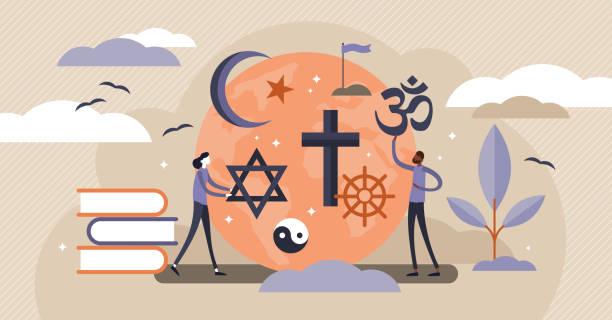YOUR RELIGION IS YOUR FAITH-How can religious literacy contribute to a more harmonious society? By Hugo Keji

Religious literacy plays a critical role in fostering a more harmonious society by promoting understanding, reducing prejudice, and encouraging respectful dialogue among people of different beliefs. Here's how it contributes:
1. Reducing Stereotypes and Prejudice
- Informed Understanding: Religious literacy helps individuals understand the beliefs, practices, and values of different religions, reducing ignorance and the stereotypes that often stem from it. When people have accurate knowledge about religions other than their own, they are less likely to harbor misconceptions or prejudices.
- Breaking Down Barriers: Understanding the diversity within and between religions can help dismantle the "us vs. them" mentality that can lead to social division and conflict.
2. Encouraging Respect and Empathy
- Respectful Interactions: Religious literacy teaches individuals to respect the religious beliefs and practices of others, even if they do not share them. This respect is fundamental to peaceful coexistence in a pluralistic society.
- Empathy Development: By learning about the religious experiences and perspectives of others, individuals can develop empathy, which is crucial for harmonious relationships. Empathy allows people to see the world from others' viewpoints, fostering compassion and understanding.
3. Facilitating Interfaith Dialogue
- Constructive Conversations: Religious literacy provides the knowledge base necessary for meaningful and respectful interfaith dialogue. When people are well-informed about different religions, they can engage in conversations that promote mutual understanding rather than conflict.
- Conflict Resolution: In contexts where religious differences may lead to tension, religious literacy can be a tool for conflict resolution. It enables individuals to identify common ground and work through differences peacefully.
4. Promoting Social Cohesion
- Shared Values: Many religions share common values such as justice, compassion, and the importance of community. Religious literacy highlights these shared values, which can serve as a foundation for social cohesion and collective action toward common goals.
- Inclusive Identity: Religious literacy helps people appreciate the multi-faceted nature of identity, recognizing that religious beliefs are just one aspect of who we are. This understanding can contribute to a more inclusive society where people are valued for their full identity.
AfriPrime App link: FREE to download...
https://www.amazon.com/Africircle-AfriPrime/dp/B0D2M3F2JT
5. Enhancing Civic Engagement
- Informed Citizenship: In democratic societies, religious literacy contributes to informed citizenship. It allows individuals to engage in public debates and decision-making processes with a nuanced understanding of how religious beliefs and practices influence social and political issues.
- Advocacy for Rights: Religious literacy helps individuals understand the importance of religious freedom and the rights of others to practice their beliefs. This can lead to advocacy for the protection of these rights, contributing to a fair and just society.
6. Supporting Global Peace and Understanding
- Global Perspective: In an increasingly interconnected world, religious literacy helps people understand global conflicts and issues that have religious dimensions. This understanding is essential for promoting peace and cooperation on an international scale.
- Cultural Sensitivity: As people travel, work, and interact with others across the globe, religious literacy fosters cultural sensitivity and respect for diverse practices, which is crucial for harmonious international relations.
7. Encouraging Personal Growth
- Self-Reflection: Religious literacy encourages individuals to reflect on their own beliefs and how they relate to others. This self-awareness can lead to personal growth and a deeper understanding of one’s values and worldview.
- Moral Development: By exploring the moral teachings of different religions, individuals can develop a stronger ethical foundation, which can guide their actions and interactions in society.
8. Strengthening Community Bonds
- Interfaith Initiatives: Religious literacy can inspire interfaith initiatives that bring together people from different religious backgrounds to work on common projects, such as community service or social justice efforts. These collaborations strengthen community bonds and contribute to a more harmonious society.
In summary, religious literacy equips individuals with the knowledge, understanding, and empathy needed to navigate a diverse world. By fostering respect, reducing prejudice, and encouraging constructive dialogue, religious literacy is a key ingredient in building a more harmonious and peaceful society.
AfriPrime App link: FREE to download...
Sponsored
Search
Categories
- Questions and Answers
- Opinion
- Story/Motivational/Inspiring
- Technology
- Art
- Causes
- Crafts
- Dance
- Drinks
- Film/Movie
- Fitness
- Food
- Games
- Gardening
- Health
- Home
- Literature
- Music
- Networking
- Other
- Party
- Religion
- Shopping
- Sports
- Theater
- Wellness
- News
- Culture
- War machines and policy
Read More
Ireland’s ‘progressive’ elite has fallen for a lie
Ireland's Prime Minister Simon Harris -
For decades, Dublin has been vindictively...
John Deere Tractor Price in India 2024 - TractorGyan
John Deere tractor was established as a private limited company in 1998. John Deere India Private...
Global Rolling Papers Market Demand, Industry Trends, Business Growth 2033
The global rolling papers market, also known as the cigarette paper market, is expected to...
Best Real Estate Advertisement Networks Platform in USA
In the 1970s, when the real estate industry was at its peak, people were exposed to 500...
Photoresist Market, By Source (Hematite, Magnetite, Taconite, Others), to reach USD 84.35 billion by 2029, Registering a CAGR of 3.78 %
The market analysis furnishes insights into the drivers and restraints affecting...

